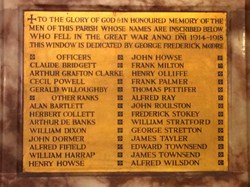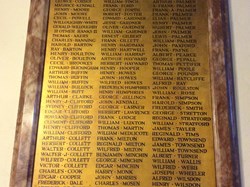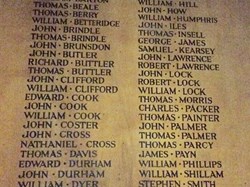History Society
The History Society has kindly provided the following information. The photograph on the left shows the dedication plaque presented to St Lawrence's Church by George Moore commemorating those who fell in the Great War (WWI). The second photo shows the list of all who fought in WWI from the PARISH of Bourton on the Water - those that survived as well as died.
The photograph at the bottom of the page shows a wall plaque tucked away in the corner of St Lawrence's Church which records the names of the 7 Officers and 72 Other Ranks from Bourton who volunteered for the fight against Napoleon (1803 - 1805). Napoleon had turned his attention to planning an invasion of England saying, "All my thoughts are directed towards England. I want only for a favourable wind to plant the Imperial Eagle on the Tower of London."
The mobilisation of the population achieved a military force of over 615,000 in December 1803. Much of the south coast of England was fortified to repel a French landing. However, Napoleon never attempted his planned invasion and so the preparations were never put to the test.
EDWIN RANSFORD, a nationally well-known singer and composer, who was born in Bourton in 1805, wrote a piece entitled 'Lines on my Native Village, Bourton on the Water, Gloucestershire' in which he mentioned the Bourton Volunteers:
Another sight to me appears;
I mean the Bourton Volunteers,
Who at the sound of fife and drum
Set all the village in a hum;
To see them mustered on the green –
A motlier group was never seen!
Some straight, some crooked, some high, some low,
Yet all made up a goodly show:
And when they were arranged in ranks,
And waiting for the Captain, Hanks,
Each seemed to say within his heart-
Oh! Won’t we make old “Bony” smart!
Then Uncle Beale was quite au fait,
With fine cocked hat and feather gay;
Who called aloud with all his might,
“Fall in!” “Attention!” and “Eyes right!”
And then he’d eye them up and down,
With now a smile, and then a frown;
But never did he better please
Than when he bade them “Stand at ease!”
And then the boys, with winks and nods,
Cried -“Come and see the Ockerd Squads!”
Who looked as stiff as any wall,
And couldn’t stand at ease at all.
And now the Band in front appeared,
Whose martial sounds were quickly heard
Who, soon as all were formed in rows
Struck up the tune of “Off she goes!”
To “Whiteshoots” then they marched away,
To “Fire!” and make a great display!
And thus a pleasant day was spent
By all who were on pleasure bent.


